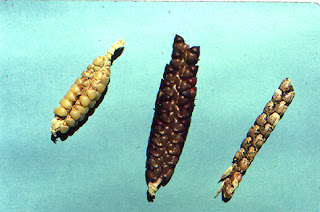You think you know what a banana is? Or a
cauliflower, broccoli, kale and brussel sprouts? Wheat, Rice and Oats?
Care to test your food knowledge?
1.
This is a banana. Almost all modern edible seedless
bananas come from two wild species – Musa acuminata and Musa balbisiana. ALL
modern bananas that you readily ingest are clones. The reason why prices
bananas in Australia became so expensive a few years ago was because during a
typhoon a large proportion of our banana fields were wiped out, and regrowth took a long time as the kind of bananas we enjoy are so genetically monomorphic. Not as simple as planting a few seeds in the
ground to recoup losses.
2.
This is wild cabbage. The historical
ancestor or all variations of cauliflower, broccoli, kale, brussel sprouts,
broccoli and more lesser known varieties.
3.
And this is corn. The ancestor to corn is drastically
different from the corn that most people know. It is believed that corn came
from a grass called teosinte.
How did you go?
Simply put, most food you eat has undergone genetic modification through human intervention. The idea that GMO are Frankenfoods is ridiculous. This rests on the proposition that there’s something natural about agriculture. Farming is just a 12,000 year old way of optimizing lunch.
Matt Ridley explains -
‘Almost by definition all crop plants are ‘genetically modified’. They are monstrous mutants capable of yielding unnaturally large, free-threshing seeds or heavy, sweet fruits and dependent on human intervention to survive. Carrots are orange thanks only to the selection of a mutant first discovered perhaps as late as the sixteenth century in Holland. Bananas are sterile and incapable of setting seed. Wheat has three whole diploid genomes in each of its cells, descended from three different wild grasses, and simply cannot survive as a wild plant – you never encounter wild wheat.’
Agriculture is the story of humans
rearranging plant DNA. GMO allows us to be more precise in our search for
specific traits: more seeds, larger fruits, stronger flavours.
Norman Borlaug who has been called
"the father of the Green Revolution", "agriculture's greatest
spokesperson" and "The Man Who Saved A Billion Lives" developed
a new wheat strain called Dwarf Wheat that helped to increase wheat yields in
developing countries. With it he literally
saved billions of lives. Borlaug continually advocated increasing crop yields
as a means to curb deforestation.
The Kansas-based Land Institute is
attempting to turn annual food crops like wheat and crops into perennials.
Perennials allow for long roots and diverse living architectures to form that
indeed support the environment far more than having to dig-up the ground every
year to plant more seeds.
Earlier this year Mark Lynas publicly
apologized for his anti-GMO stance over nearly two decades. Lynas is best known
for spearheading anti-GMO campaigns in the UK during the 1990s, which led to a
great deal of unfounded hysteria over the possible ill effects of GMO crops on
consumers and the environment.
‘I want to start with some apologies. For the record, here and upfront, I apologise for having spent several years ripping up GM crops. I am also sorry that I helped to start the anti-GM movement back in the mid 1990s, and that I thereby assisted in demonising an important technological option which can be used to benefit the environment.
As an environmentalist, and someone who believes that everyone in this world has a right to a healthy and nutritious diet of their choosing, I could not have chosen a more counter-productive path. I now regret it completely.
So I guess you'll be wondering-what happened between 1995 and now that made me not only change my mind but come here and admit it? Well, the answer is fairly simple: I discovered science, and in the process I hope I became a better environmentalist.’
GMO is different from chemical (pesticides, herbicides and chemical fertilizer) but not different from organic. You CAN have organic GMO and if you have eaten regularly in your life you have.
The GM debate and the issues surrounding
how Monsato is acting has become a conflated mess. This does not mean that
Monsanto et al aren't evil, or that we wouldn't be better off without
particular GMO strains. There are issues with GMO, specifically that no one wants to see just a
few companies in charge of our food supply: who owns the seed and the rights to the manipulations is the real
issue, and it is this, and not the 'unnatural-ness' of out fruit and veggies that we ought to be protesting.
Follow this link to see 5 myths about GMO





No comments:
Post a Comment